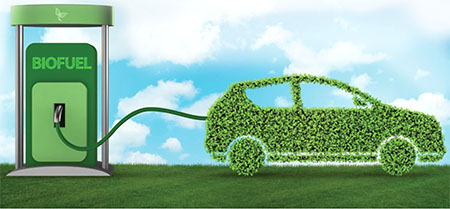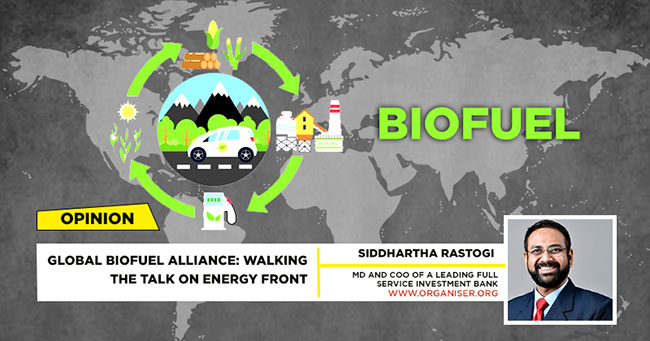Prime Minister Narendra Modi during G20 summit announced the formation of the Global Biofuels Alliance (GBA). The alliance includes more than 30 countries and international organizations, aimed at promoting the adoption of biofuels and expanding bioenergy access in emerging economies. This came in the backdrop of launch of world’s first 100 per cent ethanol-powered car by Bharat. Now it becomes important to understand this new source of energy.
Why did the Government fast-track the E20 programme? Can Ethanol enable Bharat to achieve its commitment of NetT Zero by 2070?
How will E20 ensure that Bharat eventually emerges free from the deep dark entanglements of foreign fossil fuel?
Manusmiriti, one of the most revered, ancient and historic scriptures of Bharat has a quote that defines and decodes everything about life, happiness, business, society, community or country.
‘‘सर्वं परवशं दु:खं, सर्वमात्मवशं सुखम्’’
Meaning: Everything that is in others’ control is always painful. All that is in one’s own self-control is pleasant and brings happiness.
The peripheral and worldly meaning of it is that one, who is self–reliant, self-dependent and self-subsistent is always happy, fortuitous and propitious, but for others that’s not the case, as more often priorities, preferences and precedences keep altering.
The deeper meaning of it is that happiness comes from within as one goes deeper inside one’s own self rather than finding it outside in things, people or external environment.

For the purpose of the note and the context of Bharat’s emergence as the leader, role model and champion for climate change, the first definition, description and depiction are relevant.
Bharat for centuries has looked at Ekatamik (conjunct) co-existence, whether it pertains to plants, animals, nature or any other part of ecology. Everything from humans to mountains to rivers, to oceans to minerals deep embedded in the bedrock of Earth or sea are all conjoint and part of the super macro manifestation of the universe. This has been the Vedic philosophy of Bharat and it further believed that harm to any part of the ecology is bound to have an impact on human lives sooner or later.
What the Western world is making a hue and cry today about climate change, Bharat has been practising for generations and millenniums. For example, the concept of minimalism and recycling is gaining popularity in the West today, but the same has been pursued through the Vedic era in Bharat where saints and sages have been living in bare clothing throughout their lives. Even for householders, the first clothes the newborn wears are not new but of his or her sibling or cousin or given by one of the relatives perpetuating the concept of recycling, re-usage and finding utility from the waste from the earliest periods.
With this view, thinking and ideology the blending of Ethanol with petrol has come as a boon for every aspect of the environment, and ecology and makes good economic sense as well.
Before moving forward, let’s understand what is Ethanol which is popularly perceived as a byproduct of molasses (viscose substance resulting from refining sugar cane). Ethanol is a chemical compound, also called ethyl alcohol, which is a mix of ethane gas and water. Ethanol is a clear colourless liquid with a vinous odor and a pungent taste.
How is this chemical compound useful and how is it changing the economics for the country and household both in parallel?
For any country to progress, the movement of people and the movement of goods are essential and thus comes road transportation and the existence of vehicles.
India is a large country, with a wide geographical spread with the largest population and thus needs excellent logistics systems to ensure price consistency as well as economies of scale for the producer of goods.
Thus the automotive industry comes into the picture and remains critical for the growth and progress of the nation. India realised this early in its evolution and thus India emerged several decades back as one of the countries with the largest automobile industry.

“The launch of the Global Biofuel Alliance marks a watershed moment in our quest towards sustainability and clean energy. I thank the member nations who have joined this Alliance ” — Narendra Modi, Prime Minister
To put this in perspective, India at present manufactures 26 million vehicles annually. These predominantly can be divided into four sub-categories: Passenger Vehicles, Commercial Vehicles, Three Wheelers and Two Wheelers. India last year (FY 23) also exported 4.70 million vehicles, one of the highest in the world.
With these astounding numbers, India today stands as the largest Tractor Manufacturer in the world, second largest bus and two-wheeler manufacturer, third largest heavy truck manufacturer and the fourth largest car manufacturer in the world. Estimates suggest that India will be the world’s third-largest automotive market by 2026.
However, the vision of India is to be the largest manufacturer and largest market for automotive by 2030 to ease the commuting challenges for the common man as well as to reduce the logistics cost for the business which stands at 13 per cent whilst for the world average is 8 per cent and the US is at 9 per cent. India aims to bring this down to 7.5 per cent by 2028 which will immensely benefit the end user as well as the corporations.
The cost of ethanol is 45 per cent lower than petrol and thus makes economic sense. Furthermore, Ethanol not only reduces India’s dependence on Oil Imports that continue to force India to own a large quantum of foreign reserves in USD but also prevents the world from Rupification (making Rupee a dependent currency instead of AatmaNirbhar Currency)
Techniques of Ethanol Production
India is the third largest importer of crude and natural gas in the world with an import bill of ~ 158 billion USD in FY 23. The FY 23 bill expanded from 121 billion USD in FY 22 on account of a rise in Crude Prices and expanding energy and fuel demand by rising India.
The Central Government envisaged this and thus in 2018, the National Biofuel Policy was introduced that targeted reducing dependence on imports by encouraging fuel blending keeping bioethanol, biodiesel and bio CNG in focus. The Policy’s key parts included the Ethanol Blending Programme (EPB), the production of second-generation ethanol and increasing capacity for the production of fuel additives, and R&D in feedstock.
Before proceeding further, let’s understand what are the various methodologies of producing Ethanol or in popular parlance 1G, 2G or 3G ethanol. Here the G stands for Generation. Every generation of ethanol represents the input or raw material required to produce ethanol. The more useless the raw material for public consumption, the higher the level of technology involvement and the better the outcome from a climate change perspective.
- 1G ethanol is the ethanol produced from raw materials like corn seeds, rice or sugarcane; all of which are food sources.
- 2G Ethanol – This Ethanol is produced using inedible farm waste, left over after harvest. Corn cobs, rice husks, wheat straw and sugarcane bagasse are transposed into cellulose and then fermented, producing 2G Ethanol. The stubble (popularly called Parali in northern parts of India) burning in Punjab, Haryana in the past few years has been in the news for creating pollution in the capital city with governments of both states Punjab and Delhi blaming each other for the smoke and pollution. With 2G ethanol production picking up, that stubble (Parali) burning has vanished as it fetches ~ 3000 Rs per ton, thereby enhancing earnings for the farmer.
- 3G Ethanol – This is still under the pilot and testing phase and has not been commercially exploited extensively. Here Algae grown in wastewater, sewage or saltwater is used to produce 3G bioethanol. Water which is not fit for human consumption is utilised.
Till about a few years back, a large part of Ethanol was produced from molasses by refining sugarcane, post which the production of Ethanol shifted to broken rice and corn. At present initiatives are being undertaken to produce ethanol from bamboo, which can be grown on barren land and from stubble or waste of Wheat and rice produce.
135 factories are processing stubble in the Northern States of Punjab, Haryana, and Uttar Pradesh to produce Ethanol and several factories exist in Assam to produce ethanol from bamboo.
Central Government’s Novel solution
In 2018, the Government set its eyes on having a blend of 20 per cent Ethanol mixed with petrol to be achieved for all vehicles by 2030. The interim target of 10 per cent blended was set to be achieved by Nov 2022.
But by June 2022 the target of 10 per cent blending was met way ahead of schedule and thus the Government postponed the target of 20 per cent popularly known as E20 petrol by 2025. Further, the Government is testing to run two-wheelers completely on Ethanol and leading two-wheeler manufacturers including Bajaj, TVS and Hero are leading this initiative of having motorbikes completely run on Ethanol. Apart from this, a leading Japanese car manufacturer Toyota is working in India to bring a Sedan that will run on 100 per cent Ethanol.
Diversification in Farmer Earnings
This pilot will not only be helpful for the nation but will be cheaper on the pocket for citizens as petrol costs Rs 108 a litre, whilst a litre of ethanol costs Rs 65-66. Thus reducing the mobility cost tremendously and increasing the disposable income in the hands of householders as well as reducing the pollution to a great extent.
Since the raw material for Ethanol is being produced by farmers, it adds to the income of the farmers rather than money being sent to Saudi Arabia or Russia to purchase the oil. Blending of Ethanol will save a few billion dollars every year to be paid outside the country. This also helps farmers to move away from the seasonality and cyclicality of the demand and supply of food grains that impact the farmer’s income.
The demand for Ethanol as fuel is consistent and thus helps farmers to achieve better realisation. Ten per cent blending of Ethanal in the last eight years has augmented India’s energy security and saved forex outflow of over Rs 41,500 crores, reduced Green House Gas emissions of 27 lakh metric tons and payment of over Rs 40,600 crores to farmers. The Government is committed to achieving net zero by 2070 and at present 38 per cent of the total power comes from solar in the power basket. The emergence of Ethanol will further the cause of ecology and environment as time and Bharat moves forward.




















Comments